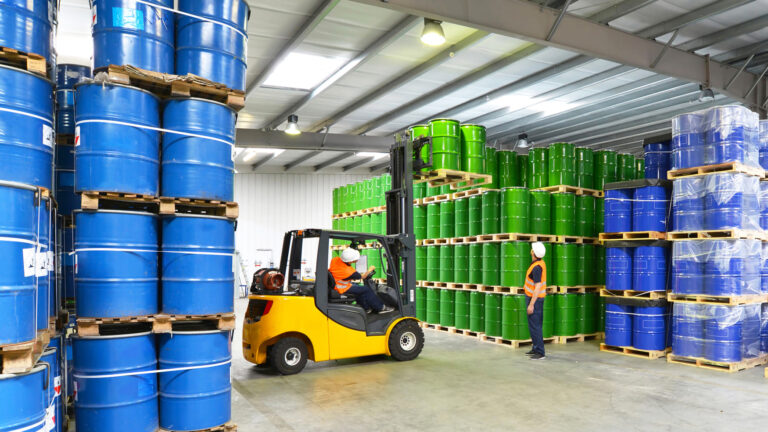Medical Logistics: Key Strategies & Solutions for Healthcare Supply Chains

Medical logistics (also called healthcare logistics) is the specialized coordination of medical supplies, equipment, and pharmaceuticals from manufacturers through the supply chain to healthcare providers and patients. In other words, it ensures that hospitals, clinics, pharmacies, and patients get the right medical products at the right time. Because these goods are critical to patient care, medical logistics has higher stakes than ordinary shipping, errors or delays can literally affect patient outcomes. This field covers every step of the flow, from sourcing and warehousing to transportation and distribution, all under strict conditions to protect product integrity and safety.
Efficient medical logistics requires a connected medical supply chain that links raw-material suppliers, manufacturers, 3PL warehouses, and healthcare facilities. Key players include:
- Manufacturers: Produce medical products (drugs, devices, PPE) and ship them to distribution centers or contract warehouses.
- Distributors & Medical Warehouses: Store inventory in strategic locations, managing stock levels and handling order fulfillment.
- Transportation Providers: Move goods via ground, air, or ocean freight. They must offer time-sensitive options (like expedited couriers or cold-chain shipping) to meet healthcare schedules.
- Healthcare Providers (End-Users): Hospitals, clinics, pharmacies, and patients who receive the supplies. Logistics partners ensure each delivery is on time and complies with medical standards.
An effective healthcare supply chain transmits demand signals upstream (from providers back to manufacturers) and delivers supplies downstream (from factories to patient beds) in a cost-efficient, timely manner.
Medical Supply Logistics vs. Medical Equipment Logistics
Medical logistics generally splits into two areas: medical supply logistics and medical equipment logistics, each with distinct needs.
- Medical Supply Logistics:
- Involves consumables such as pharmaceuticals, vaccines, IV fluids, PPE, test kits, and syringes.
- These are usually high-volume items with short shelf lives or expiration dates.
- Many require cold chain logistics (constant refrigeration or freezing) to stay effective.
- Logistics focuses on rapid replenishment, batch tracking, and recall management to ensure product integrity and safety.
- Involves consumables such as pharmaceuticals, vaccines, IV fluids, PPE, test kits, and syringes.
- Medical Equipment Logistics:
- Focuses on larger, high-value assets like MRI machines, ventilators, hospital beds, or surgical tools.
- Items are often bulky, fragile, or sensitive, requiring special packaging, crating, or shock-proof transport.
- Compliance may extend to hazmat regulations for batteries or chemicals within the equipment.
- Delivery often goes beyond drop-off, logistics providers may handle installation, setup, or white-glove service inside the facility.
- Focuses on larger, high-value assets like MRI machines, ventilators, hospital beds, or surgical tools.
Key Difference:
- Supplies: fast-moving, consumable, require precise storage and replenishment.
- Equipment: durable, high-value, requires special handling and secure transport.
In both cases, logistics providers must ensure timely delivery, regulatory compliance, and product safety at every step.
Special Considerations in Healthcare Logistics
Managing a healthcare supply chain involves unique challenges:
- Temperature & Humidity Control: Many medical products (e.g. vaccines, biologics, blood samples) require continuous cold-chain or controlled environments. Specialized refrigerated storage and climate-controlled transport (reefers, insulated packaging) keep these products effective.
- Regulatory Compliance: The logistics of FDA-regulated drugs and devices are subject to stringent standards (GDP, GMP, FDA rules). Every step must be documented (batch numbers, chain-of-custody) to ensure traceability and prevent counterfeiting. Warehouses and carriers often need FDA or ISO 13485 certifications, strict security protocols, and rigorous audits to meet these requirements.
- Secure Packaging & Handling: Medical shipments often use tamper-evident seals, temperature probes, and shock-absorbent packaging. High-value or sterile products may require cleanroom storage, sterile packing, or certified personnel. White-glove delivery services (with trained handlers) are common for expensive equipment to minimize damage.
- Speed & Availability: Healthcare emergencies demand 24/7 readiness. Logistics providers must offer time-definite shipping (like dedicated couriers or emergency airfreight) and maintain safety stock (buffer inventory) to avoid life-critical shortages.
- Tracking & Insurance: Continuous monitoring (GPS tracking, RFID sensors) provides visibility of shipments. Providers insure high-value medical cargo. For example, a medical logistics company must ensure shipments are insured and traceable in case of any incident.
Meeting these needs often requires partnering with specialists in healthcare logistics (see below), since ordinary freight services usually lack the expertise or certifications required.
Medical Warehousing & Healthcare Storage Solutions
Medical warehousing (or healthcare warehousing) refers to specialized storage facilities for medical products. These warehouses are highly regulated and equipped for healthcare needs:
- FDA/GMP Compliance: Warehouses must meet FDA and Good Manufacturing Practice standards. This includes secure, clean environments with features like restricted access zones, surveillance cameras, and environmental controls. They strictly follow FDA guidelines for temperature, labeling, and batch tracking.
- Temperature-Controlled Space: A significant portion of medical warehousing is temperature-controlled. Specialized cold storage (refrigerated or frozen) is available for vaccines, biologics, and certain medications. For example, climate-controlled zones maintain consistent 2–8°C or lower, as required by many drug manufacturers.
- Cleanliness & Sterility: Warehouses implement cleanroom protocols to prevent contamination of sterile supplies and devices. Surfaces are routinely sanitized, and ambient humidity is controlled.
- Inventory Management: Advanced warehouse management systems (WMS) and barcoding/RFID are used to track lot numbers, expiration dates, and location of every item. This ensures quick recalls and real-time stock visibility.
- High-Value Security: Given the expense of medical products, many facilities are equipped with enhanced security (armed guards, biometric access, 24/7 monitoring).
- Healthcare Warehousing Partnerships: Third-party logistics (3PL) providers often offer dedicated healthcare warehouses. For instance, Olimp’s medical warehousing services emphasize FDA-compliant storage of pharmaceuticals and medical devices. Healthcare companies partner with such 3PLs to tap into nationwide networks of medical-grade warehouses without building their own.
Overall, modern medical warehouses are more than just storage space, they are fully compliant logistics hubs that safeguard product integrity and streamline medical supply distribution.
Partnering with Medical Logistics Companies
Most hospitals and healthcare manufacturers outsource logistics to specialized medical logistics companies or healthcare logistics providers. When choosing a partner, consider:
- Industry Expertise & Certifications: Look for companies with healthcare focus, trained staff, and relevant certifications (e.g. ISO 13485, FDA registration). Leading providers have decades of experience handling sensitive medical cargos and maintain clean-room facilities. For example, some 3PLs are ISO-certified and offer ultra-clean storage for critical shipments.
- Comprehensive Services: Reliable medical logistics companies provide end-to-end solutions. This may include custom packaging, kitting, labeling, and even the assembly of medical kits. Many also offer white-glove last-mile delivery for high-value medical devices, ensuring secure handling and precise installation. A well-rounded partner should cover every step of medical product logistics from warehouse to patient.
- Technological Capabilities: Advanced tracking and warehouse management systems are essential. Real-time monitoring (IoT sensors, RFID) and predictive analytics (AI forecasting) improve reliability and minimize stockouts in the medical supply chain.
- Scalability & Network: The partner should have a wide network of compliant warehouses and carriers. This ensures you can scale up storage or shipping lanes quickly during a crisis.
- Regulatory Compliance: Ensure the company understands healthcare regulations. Proper handling of controlled substances or biologics can involve customs and import requirements as well. Outsourcing logistics enables healthcare organizations to focus on patient care while the provider handles the complexities of compliance.
By partnering with an experienced medical logistics company or third-party healthcare logistics firm, organizations gain the reliability, speed, and compliance needed for critical medical deliveries. In fact, studies note that pharmaceutical and healthcare companies routinely depend on 3PLs for secure handling and distribution of medical supplies and equipment.
How OLIMP Warehousing Supports Medical Logistics
Efficient medical product logistics and healthcare warehousing can dramatically improve service levels and patient safety. Whether you manage a hospital supply room or a pharmaceutical plant, the right logistics strategies will reduce costs, improve compliance, and prevent shortages.
Ready to optimize your medical supply chain? Partner with Olimp Warehousing, a trusted medical logistics company with nationwide coverage. Olimp’s network of FDA-compliant facilities and experienced 3PL providers ensures secure warehousing, reliable transportation, and full regulatory compliance. With Olimp, you gain fast, safe, and cost-effective solutions in medical supply logistics, so you can focus on what matters most: patient care.
Request a Quote with Olimp Warehousing today and streamline your healthcare logistics with confidence.
You may be interested in

Pharmaceutical Warehousing & Distribution: Safe, Compliant Storage Solutions
Effective pharmaceutical warehousing ensures medicines and healthcare products are stored, handled, and distributed under strict conditions. Specialized pharma warehouses use advanced inventory systems, precise temperature control, and rigorous processes to maintain drug quality. Compliance with regulations like FDA cGMP, Good Storage Practice (GSP), and Good Distribution Practice (GDP) is mandatory. For example, GDP mandates that […]

Chemical Warehousing & HAZMAT Storage: Safety, Standards, and Best Practices
Chemical warehouse storing drums of hazardous substances under safety controls. Chemical warehousing (also called hazardous materials or HAZMAT warehousing) refers to specialized storage of chemicals and other dangerous goods under strict safety and regulatory controls. These facilities are designed to prevent accidents by segregating incompatible substances and complying with rigorous safety standards. In North America, […]

Food & Beverage Logistics: Supply Chain, Warehousing & Transportation Guide
Food and beverage logistics covers everything from processing and packaging to shipping and delivery of perishable goods. It is essentially the movement of food products from origin (farm or factory) to consumers. In 2025, this industry fuels a global market worth over $9 trillion, so optimizing the food & beverage supply chain is critical. Key […]
Ready to streamline your warehousing needs?
Request a quote today and discover how OLIMP's tailored solutions can optimize your operations